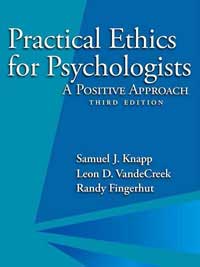 360 pages
360 pages12 CE credits
Course Enrollment
$240.00
Add to Cart
All exams are taken online. The exam for this course will be available in "My Courses" immediately upon enrollment. Note the book is not included.
The book is available for purchase from Amazon.
As an Amazon Associate we receive a rebate from qualifying purchases.
A New York State licensee is responsible for complying with New York Laws, rules and regulations. You may want to consult the Office of the Professions website which provides information about professional practice in NYS.
PRACTICAL ETHICS FOR PSYCHOLOGISTS
A Positive Approach. 3rd Edition
Samuel J. Knapp, Ed.D, Leon D. VandeCreek, Ph.D, and Randy Fingerhut, Ph.DAmerican Psychological Association, 2017
DESCRIPTION
Guided by the American Psychological Association's "Ethical Principles of Psychologists and Code of Conduct," this book illustrates how psychologists can actualize their ethical acumen in their daily work. The authors discuss a variety of ethically tricky areas for psychologists, including patient confidentiality and inappropriate relationships, and provide risk-reduction strategies as well as a five-step decision-making model for difficult ethical quandaries.
This third edition of Practical Ethics for Psychologists includes new findings on the science of morality and on working with morally diverse clients, and ethical issues regarding the use of social media and other online communications.
The reader will be able to:
• Discuss APA's suggestion that the goal of 'positive ethics' is to shift focus away from discipline and wrongdoing to promoting high standards
• Apply codes of foundational ethical guidance on competencies
• Define informed consent and discuss APA's ethics code regarding the significance of it
• Examine ethical as well as clinical directives on boundaries in psychotherapy
• Apply ethical codes and guidance concerning confidentiality
• Recognize the signs of life-endangering patients and know when psychologists can and should disclose confidential patient information
• Review the skills one needs to practice forensic psychology
• Describe assessment: its goals and principles, its uses, and compile a resource list of assessment-measurement tools
• Explain and apply therapy principles and enforceable standards
• List any special considerations the APA's Code applies toward business ethics
• Describe foundational ethical theories and codes directed specifically toward educators
• Provide guidance to supervisors on resources to ethics in the workplace and how to apply this guidance
• Aim the same ethical considerations to scientific and other researchers
AUTHOR
Samuel J. Knapp, ED.D., is the director of professional affairs for the Pennsylvania Psychological Association and has authored numerous books and articles.
Leon D. VandeCreek, Ph.D., is a professor in the School of Professional Psychology at Wright State University. Randy Fungerhut, Ph.D, is an associate professor of psychology at La Salle University and the directo of La Sall University's PsyD program in clinical psychology.
ISHK CE at Home
1702-L Meridian Ave., #266
San Jose, CA 95125-5586
This website uses cookies to ensure you get the best experience on our website. Learn more
